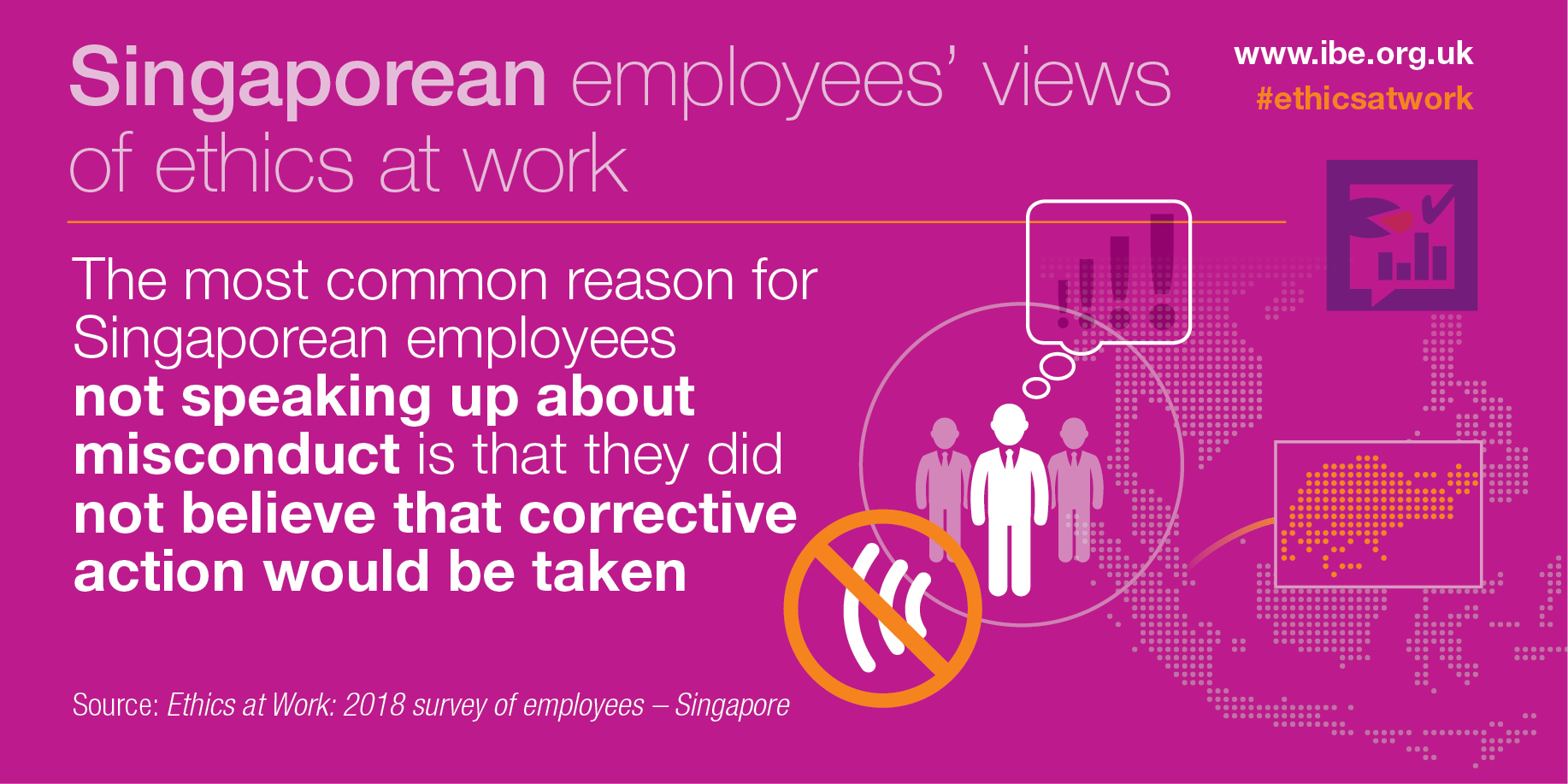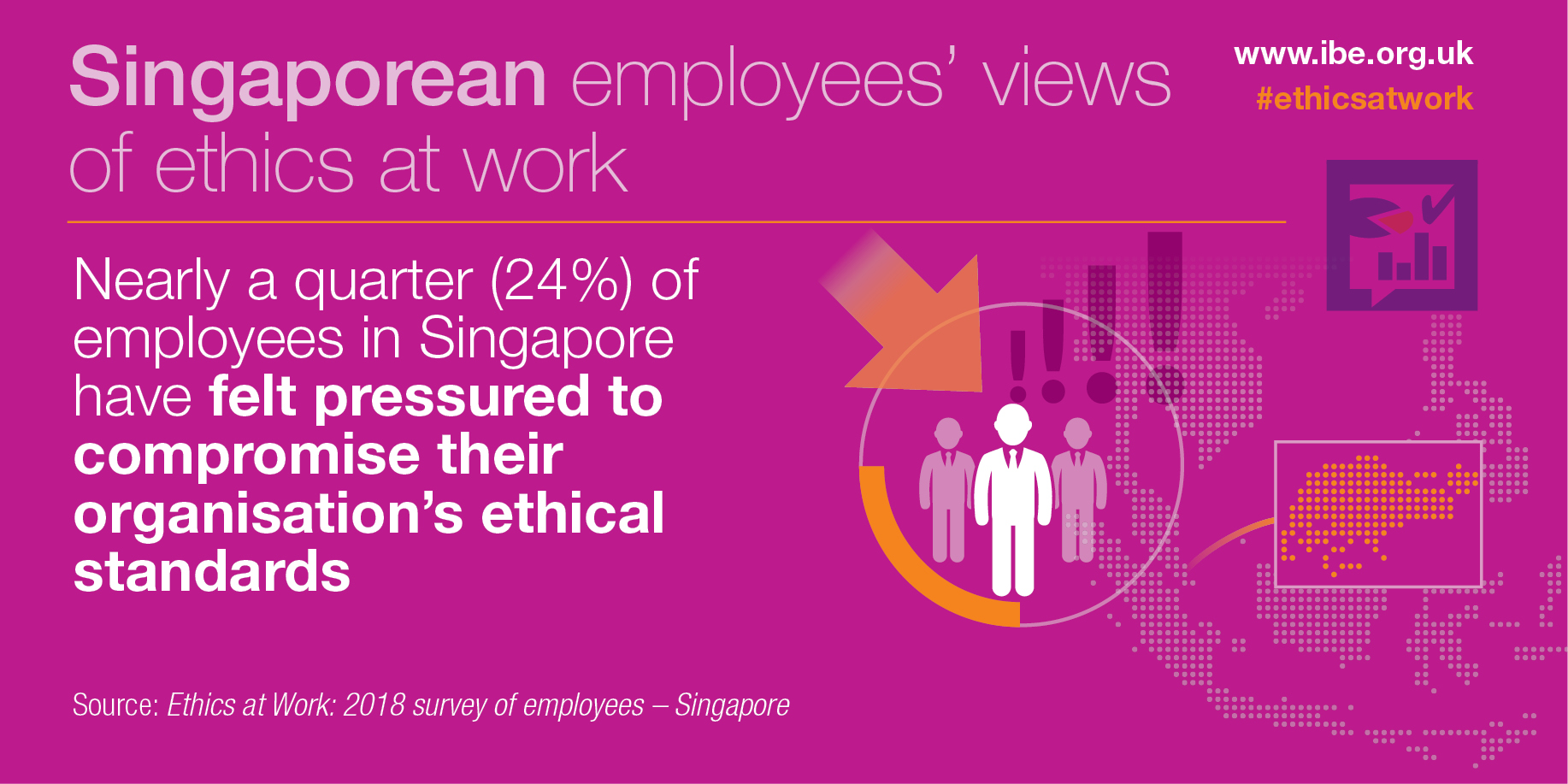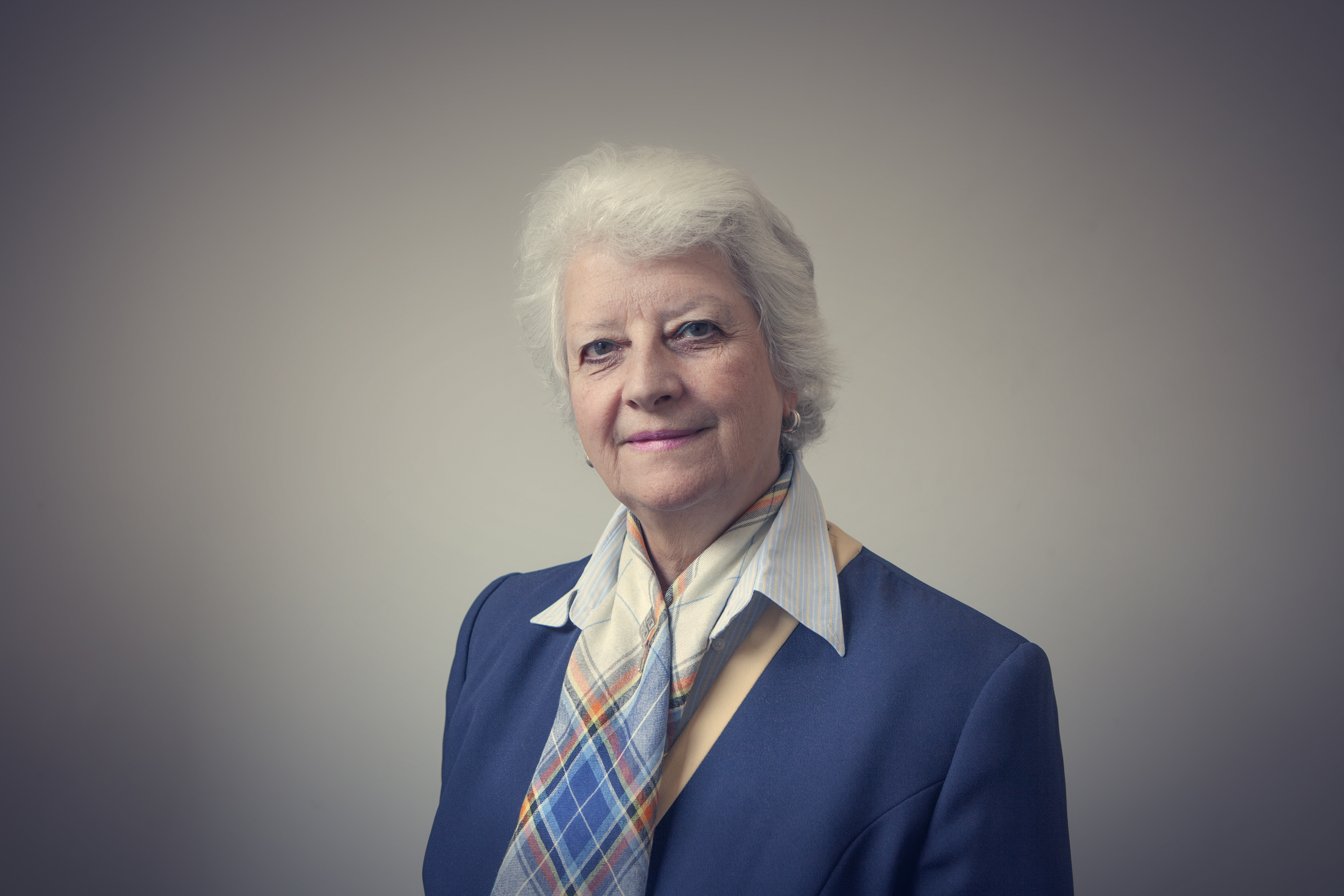A quarter of Singaporean employees felt pressured to compromise ethical standards, reveals Institute of Business Ethics’ survey
A quarter of Singaporean employees felt pressured to compromise ethical standards, reveals Institute of Business Ethics’ survey
Yet less than two thirds who were aware of misconduct reported it.
DATE 23rd September 2019 The Institute of Business Ethics today publishes the results of a survey which asked employees in Singapore their views of ethics in their workplace.
This is the first time that the IBE’s Ethics at Work survey was conducted in Singapore. It asked employees how they experienced ethics in their day-to-day working lives and their perception of how ethical conduct is supported in the workplace. It asked whether they witnessed misconduct; whether they reported it; and what, if anything, stopped them from doing so.
The IBE has surveyed British employees since 2005, but given that organisations are increasingly taking an integrated approach at the international level, we have expanded the number of countries included in the research to cover France, Germany, Ireland, Italy, Portugal, Spain, Switzerland and the UK within Europe, as well as Australia, Canada, Singapore and New Zealand.
This survey report presents the findings of public research undertaken by ComRes on behalf of the IBE and the Stewardship Institute and describes the findings in Singapore and provides comparison with Switzerland and the UK.
Nearly a quarter (24%) of employees in Singapore had felt pressured to compromise their organisation’s ethical standards and over a third (35%) were aware of misconduct during their past year at work. Awareness of misconduct was higher among Singaporean employees than Swiss (16%) or UK respondents (12%). Inappropriate or unethical treatment of people (50%) and misreporting hours worked (37%) were the most common types of misconduct reported.
Yet less than two thirds (60%) of survey respondents who were aware of misconduct said they raised their concerns with management or another appropriate mechanism.
Of those employees in Singapore who were aware of misconduct at work and decided not to speak up, the main reason was because they did not believe corrective action would be taken (41%). Yet, employees in Singapore who were aware of misconduct and spoke up were more likely to be satisfied with the result (71%) than employees in any other country surveyed.
Philippa Foster Back CBE, Director of the Institute of Business Ethics said: “The results of the Ethics at Work survey in Singapore show the impact managers have on employee behaviour, with a third saying they felt pressured by their bosses to compromise ethical standards. However, it also shows the positive impact of effective Speak Up procedures on employees. If organisations demonstrate their commitment to addressing concerns, employees will be more inclined to speak up about misconduct.”
#ethicsatwork
ENDS/
To obtain an advanced press copy of the report, or Op-Eds please contact Katherine Bradshaw, Head of Communications k.bradshaw@ibe.org.uk
EDITOR’S NOTES
Ethics at Work: 2018 Survey of Employees: Singapore
By Guendalina Dondé, Katja Somasundaram, Loic Frank
ISBN 978-1-908534-38-5
Publication date: 23rd September 2019
About the Ethics at Work survey
The IBE has surveyed British employees since 2005, but given that organisations are increasingly taking an integrated approach at the international level, we have expanded the number of countries included in the research to cover France, Germany, Ireland, Italy, Portugal, Spain, Switzerland and the UK within Europe, as well as Australia, Canada, Singapore and New Zealand.
This survey report presents the findings of public research undertaken by ComRes on behalf of the IBE and the Stewardship Institute.
This report describes the Singaporean findings and provides comparison with Switzerland and the UK. The survey was completed by a representative sample of around 750 working adults in each country aged 18+, including 759 working adults in Singapore. The survey was undertaken between 5th and 25th February 2018.
ComRes is a member of the British Polling Council and abides by its rules. www.comresglobal.com
The Institute of Business Ethics
The Institute of Business Ethics, whose purpose is to promote high standards of business behaviour based on ethical values, is an important partner to any business wanting to preserve its long-term reputation by doing business in the right way.
For over 30 years, the IBE has advised organisations on how to strengthen their ethical culture by sharing knowledge and good practice, resulting in relationships with employees and stakeholders that are based on trust.
The IBE is a registered charity funded by corporate and individual subscriptions. www.ibe.org.uk @ibeuk
The IBE would like to thank our national partner the Stewardship Institute for their support for this project:
The Stewardship Institute
The Stewardship Institute brings together leading economic actors from corporate and investment worlds to combine their knowledge and experience, encouraging business wealth creation towards positive social impact.
This is not about giving back. This is more about how businesses can be more of a positive force in society.
By providing scientific research, investment and guidance, the Stewardship Institute builds and supports a network of change-makers who take action to advance societal goals and tackle societal challenges. We enable them to shape a strong and positive economy, socially sustainable and preferable to all.
For more information www.stewardshipinstitute.com
The authors
Guendalina Dondé is Head of Research at the Institute of Business Ethics. She writes and researches on a range of business ethics topics for the IBE.
Before joining the IBE, she collaborated in developing the code of ethics for the Italian Association of Management Consultants and worked for a European CSR Business Network in Brussels. She holds a Master’s degree in Business Ethics and CSR from the University of Trento in Italy.
She is the author of the IBE survey report Corporate Ethics Policies and Programmes: 2016 UK and Continental Europe Survey and co-author of the 2017 IBE report Setting the Tone: a New Zealand perspective on Business Ethics, the 2017 TEI & IBE Ethics and Compliance Handbook, the 2016 IBE Codes of Business Ethics: examples of good practice and of the French and Italian editions of the 2015 IBE survey Ethics at Work: 2015 Survey of Employees.
She is also responsible for reviewing corporate codes of ethics and related policies, benchmarking them against other organisations’.
Katja Somasundaram worked at the IBE as Research Assistant, where she provided support for the Research Hub by researching and writing on a number of business ethics topics. She worked for the IBE from 2017 to 2018. Katja holds a master’s degree in Corruption and Governance from the University of Sussex.
Loïc Frank is Director of Operations at the Stewardship Institute, a foundation based in Switzerland. He co-created the IMD Global Board Center at IMB Business School. Over the past 10 years he has managed a large number of board education programmes, board evaluations and reviews. He holds a bachelor’s degree in Business Administration as well as a Certificate of Advanced Studies (CAS) in Project Management, Managing Information Systems and Economics for Business, both from Business School Lausanne.
The IBE would like to thank the following IBE subscribers for their financial support for this project:
• Gold supporters: Rolls Royce
• Silver supporters: Aviva, Centrica, L’Oréal, Morgan Stanley
• Bronze supporters: Expolink
Press release distributed by Pressat on behalf of Institute of Business Ethics, on Monday 23 September, 2019. For more information subscribe and follow https://pressat.co.uk/
Ethics Business Ethics Survey Speak Up Whistleblowing Singapore Employees Ethics At Work HR Business & Finance Education & Human Resources
You just read:
A quarter of Singaporean employees felt pressured to compromise ethical standards, reveals Institute of Business Ethics’ survey
News from this source:






